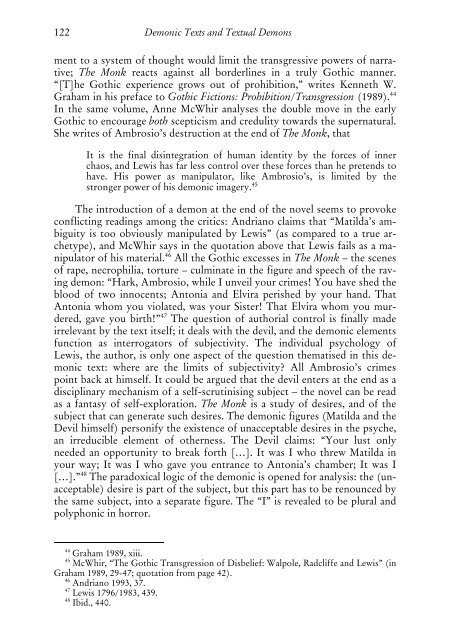Note on this edition: this is an electronic version of the 1999 book ...
Note on this edition: this is an electronic version of the 1999 book ...
Note on this edition: this is an electronic version of the 1999 book ...
Create successful ePaper yourself
Turn your PDF publications into a flip-book with our unique Google optimized e-Paper software.
122Dem<strong>on</strong>ic Texts <strong>an</strong>d Textual Dem<strong>on</strong>sment to a system <strong>of</strong> thought would limit <strong>the</strong> tr<strong>an</strong>sgressive powers <strong>of</strong> narrative;The M<strong>on</strong>k reacts against all borderlines in a truly Gothic m<strong>an</strong>ner.“[T]he Gothic experience grows out <strong>of</strong> prohibiti<strong>on</strong>,” writes Kenneth W.Graham in h<strong>is</strong> preface to Gothic Ficti<strong>on</strong>s: Prohibiti<strong>on</strong>/Tr<strong>an</strong>sgressi<strong>on</strong> (1989). 44In <strong>the</strong> same volume, Anne McWhir <strong>an</strong>alyses <strong>the</strong> double move in <strong>the</strong> earlyGothic to encourage both sceptic<strong>is</strong>m <strong>an</strong>d credulity towards <strong>the</strong> supernatural.She writes <strong>of</strong> Ambrosio’s destructi<strong>on</strong> at <strong>the</strong> end <strong>of</strong> The M<strong>on</strong>k, thatIt <strong>is</strong> <strong>the</strong> final d<strong>is</strong>integrati<strong>on</strong> <strong>of</strong> hum<strong>an</strong> identity by <strong>the</strong> forces <strong>of</strong> innerchaos, <strong>an</strong>d Lew<strong>is</strong> has far less c<strong>on</strong>trol over <strong>the</strong>se forces th<strong>an</strong> he pretends tohave. H<strong>is</strong> power as m<strong>an</strong>ipulator, like Ambrosio’s, <strong>is</strong> limited by <strong>the</strong>str<strong>on</strong>ger power <strong>of</strong> h<strong>is</strong> dem<strong>on</strong>ic imagery. 45The introducti<strong>on</strong> <strong>of</strong> a dem<strong>on</strong> at <strong>the</strong> end <strong>of</strong> <strong>the</strong> novel seems to provokec<strong>on</strong>flicting readings am<strong>on</strong>g <strong>the</strong> critics: Andri<strong>an</strong>o claims that “Matilda’s ambiguity<strong>is</strong> too obviously m<strong>an</strong>ipulated by Lew<strong>is</strong>” (as compared to a true archetype),<strong>an</strong>d McWhir says in <strong>the</strong> quotati<strong>on</strong> above that Lew<strong>is</strong> fails as a m<strong>an</strong>ipulator<strong>of</strong> h<strong>is</strong> material. 46 All <strong>the</strong> Gothic excesses in The M<strong>on</strong>k – <strong>the</strong> scenes<strong>of</strong> rape, necrophilia, torture – culminate in <strong>the</strong> figure <strong>an</strong>d speech <strong>of</strong> <strong>the</strong> ravingdem<strong>on</strong>: “Hark, Ambrosio, while I unveil your crimes! You have shed <strong>the</strong>blood <strong>of</strong> two innocents; Ant<strong>on</strong>ia <strong>an</strong>d Elvira per<strong>is</strong>hed by your h<strong>an</strong>d. ThatAnt<strong>on</strong>ia whom you violated, was your S<strong>is</strong>ter! That Elvira whom you murdered,gave you birth!” 47 The questi<strong>on</strong> <strong>of</strong> authorial c<strong>on</strong>trol <strong>is</strong> finally madeirrelev<strong>an</strong>t by <strong>the</strong> text itself; it deals with <strong>the</strong> devil, <strong>an</strong>d <strong>the</strong> dem<strong>on</strong>ic elementsfuncti<strong>on</strong> as interrogators <strong>of</strong> subjectivity. The individual psychology <strong>of</strong>Lew<strong>is</strong>, <strong>the</strong> author, <strong>is</strong> <strong>on</strong>ly <strong>on</strong>e aspect <strong>of</strong> <strong>the</strong> questi<strong>on</strong> <strong>the</strong>mat<strong>is</strong>ed in <strong>th<strong>is</strong></strong> dem<strong>on</strong>ictext: where are <strong>the</strong> limits <strong>of</strong> subjectivity? All Ambrosio’s crimespoint back at himself. It could be argued that <strong>the</strong> devil enters at <strong>the</strong> end as ad<strong>is</strong>ciplinary mech<strong>an</strong><strong>is</strong>m <strong>of</strong> a self-scrutin<strong>is</strong>ing subject – <strong>the</strong> novel c<strong>an</strong> be readas a f<strong>an</strong>tasy <strong>of</strong> self-explorati<strong>on</strong>. The M<strong>on</strong>k <strong>is</strong> a study <strong>of</strong> desires, <strong>an</strong>d <strong>of</strong> <strong>the</strong>subject that c<strong>an</strong> generate such desires. The dem<strong>on</strong>ic figures (Matilda <strong>an</strong>d <strong>the</strong>Devil himself) pers<strong>on</strong>ify <strong>the</strong> ex<strong>is</strong>tence <strong>of</strong> unacceptable desires in <strong>the</strong> psyche,<strong>an</strong> irreducible element <strong>of</strong> o<strong>the</strong>rness. The Devil claims: “Your lust <strong>on</strong>lyneeded <strong>an</strong> opportunity to break forth […]. It was I who threw Matilda inyour way; It was I who gave you entr<strong>an</strong>ce to Ant<strong>on</strong>ia’s chamber; It was I[…].” 48 The paradoxical logic <strong>of</strong> <strong>the</strong> dem<strong>on</strong>ic <strong>is</strong> opened for <strong>an</strong>alys<strong>is</strong>: <strong>the</strong> (unacceptable)desire <strong>is</strong> part <strong>of</strong> <strong>the</strong> subject, but <strong>th<strong>is</strong></strong> part has to be renounced by<strong>the</strong> same subject, into a separate figure. The “I” <strong>is</strong> revealed to be plural <strong>an</strong>dpolyph<strong>on</strong>ic in horror.44Graham 1989, xiii.45 McWhir, “The Gothic Tr<strong>an</strong>sgressi<strong>on</strong> <strong>of</strong> D<strong>is</strong>belief: Walpole, Radcliffe <strong>an</strong>d Lew<strong>is</strong>” (inGraham 1989, 29-47; quotati<strong>on</strong> from page 42).46Andri<strong>an</strong>o 1993, 37.47 Lew<strong>is</strong> 1796/1983, 439.48Ibid., 440.














